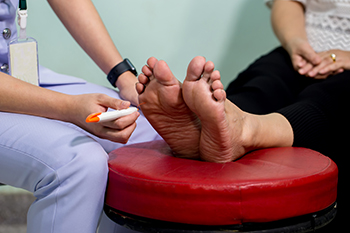
Diabetic neuropathy most often affects the peripheral regions or extremities, including the feet, which tend to bear the greatest brunt of diabetic nerve damage. Prolonged periods of uncontrolled high blood sugar can trigger a number of problematic conditions that can afflict your feet, collectively termed the diabetic foot. This encompasses a range of issues, ranging from neuropathy related numbness and tingling to more severe complications such as ulcers and infections. Proper diabetes management, a healthy lifestyle, and regular check ups with a podiatrist are essential for preventing or managing this condition, particularly when it affects the feet and lower limbs. Early intervention and a proactive approach to diabetic neuropathy can make a significant difference in preserving your overall well being. If you develop a cut or sore on your foot that does not show signs of healing over time or becomes infected, it is essential to consult a podiatrist as soon as possible. Burning sensations, tingling, weakness, or pain in your feet are often early signs of neuropathy, and should be addressed promptly. For help with this condition, it is suggested that you make an appointment with a podiatrist, who is medically trained to treat diabetic neuropathy.
Diabetic foot care is important in preventing foot ailments such as ulcers. If you are suffering from diabetes or have any other concerns about your feet, contact one of our podiatrists from New York, NY. Our doctors can provide the care you need to keep you pain-free and on your feet.
Diabetic Foot Care
Diabetes affects millions of people every year. The condition can damage blood vessels in many parts of the body, especially the feet. Because of this, taking care of your feet is essential if you have diabetes, and having a podiatrist help monitor your foot health is highly recommended.
The Importance of Caring for Your Feet
- Routinely inspect your feet for bruises or sores.
- Wear socks that fit your feet comfortably.
- Wear comfortable shoes that provide adequate support.
Patients with diabetes should have their doctor monitor their blood levels, as blood sugar levels play such a huge role in diabetic care. Monitoring these levels on a regular basis is highly advised.
It is always best to inform your healthcare professional of any concerns you may have regarding your feet, especially for diabetic patients. Early treatment and routine foot examinations are keys to maintaining proper health, especially because severe complications can arise if proper treatment is not applied.
If you have any questions please feel free to contact our office located in New York, NY . We offer the newest diagnostic and treatment technologies for all your foot and ankle needs.

